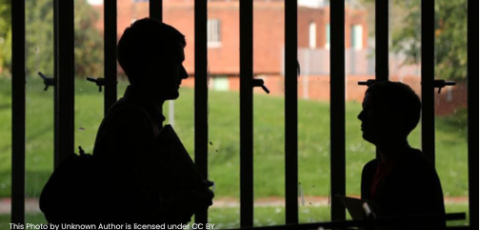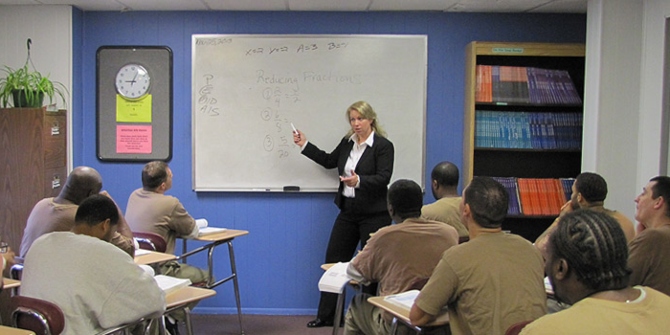Educating Prisoners: The Importance of Relationships

The Coates Report in 2016, recommended the prioritisation of prison education, but concerns persist about its efficacy. To gain an insight into the current provision of legal education within prisons, a colleague and I interviewed six Open University (OU) tutors who tutor, or have recently tutored, prison students. We were keen to understand the perspective of these tutors as they work closely with the prison students, offering regular phone tutorials as well as detailed feedback on written assignments. The tutors we spoke to in these semi-structured interviews all had at least two years’ relevant experience. What we discovered is that the relationships prisoners forge during their study can be instrumental in changing their mindsets and sense of identity. However, there are various obstacles impacting the quality and depth of these relationships.
“Learning is rooted in relationships and supportive relationships can unleash the potential in every student”1
Relationships with tutors
Our findings suggested that the dynamic between prison students and tutors results in a deeper connection than would normally develop between students and tutors on the law degree. There may be a number of reasons for this. Most notably, the one-to-one nature of tutorials allows prisoners and tutors to get to know each other and build trust. Whilst similar opportunities are offered to all OU students, the tutors feel that prison students seem especially keen to take up such opportunities and interact with someone outside of their immediate situation – someone who sees them not as a prisoner but, first and foremost, as a student.
In initial encounters tutors noted that prison students often exhibit scepticism. This dissipates, however, as they begin to see that the tutor is genuinely invested in supporting them, culminating, in some cases, in profound expressions of gratitude – for example, one tutor recalled a prisoner saying to them that they had ‘changed their life’.
Relationships with prison education officers
Another pivotal relationship identified by the tutors is that between the prisoners and the prison education officers (PEOs) who supervise the prisoners’ study within prison. According to the tutors, the PEOs are generally very supportive of the prisoners and make every effort to ensure they receive their study materials and relevant communications from their tutors. This in turn facilitates the relationship between prisoner and tutor, ensuring that prisoners do not experience delays in receiving tutor feedback on assignments and that they know when tutorials are taking place.
Do relationships matter?
But do these relationships really make a difference? It appears they do. Not only do they enhance academic engagement but commentators have observed that social bonds and relationships have the propensity to change prisoners’ mindsets and sense of identity, improving wellbeing as well as developing social skills and emotional intelligence. This is regarded as influential in what is termed the ‘desistance journey’ (the journey to abstinence from criminal behaviour), giving prisoners a sense of purpose that enables them to envision a future that does not involve crime. Rod Clark, former Chief Executive of Prisoners’ Education Trust, recognises concerns that incarceration can damage a prisoner’s social frameworks, but asserts that the relationships that arise through prison education have the scope to counter this.
This was evidenced in our case study, with tutors speaking of the growth in prisoners’ confidence and maturity as modules progressed, and the positive outcomes this had for their academic achievements, plans and relationships with others. These changes were attributed, in part, to the burgeoning relationships with their tutor and PEO. For example, one tutor said: 'As soon as they realise they’re not going to be judged… they’ve always participated really well.'

This Photo by Unknown Author is licensed under CC BY-NC
Obstacles
However, there are some obstacles to building relationships. For example, most of the tutors we spoke to felt that, whilst phone tutorials work well, it is harder to read visual cues and build trust than it was when tutorials took place face to face (pre-covid). Phone tutorials also make it harder to understand fully what materials their prisoner students have received and to work through activities together.
Our findings suggest there may be scope to use video conferencing tools in tutorials with prisoners to overcome some of these issues. Moreover, use of such tools would potentially facilitate the provision of group tutorials allowing scope for the formation of communities of practice, in which prison students could learn not just from their tutors, but from each other, considered to be a valuable asset in learning.
With regards to the relationship with PEOs, tutors observed that these relationships seem to work particularly well in larger prisons, but in some smaller prisons, resource and time constraints impede the effectiveness of this support, leaving prisoners feeling isolated. Furthermore, even where the PEOs are pro-active, the tutors commented that the prison context itself can be disruptive, due, for example, to security lockdowns or the sudden transfer of a prisoner to another prison. The latter in particular results in the loss of relationships with the PEOs and, sometimes, even with the tutor. This comment from one tutor reflects the frustrations this causes: 'That’s always a nightmare because we don’t get told often that they’ve moved. So you’re carrying on trying as a tutor to chase the education officer and then find out, weeks and weeks and weeks later, they’ve gone.'
In 2022 a House of Commons Education Committee report recommended that a prisoner’s ongoing educational requirements be considered when making decisions on movement. Our study suggests these recommendations may not have been acted on to any extent, even though implementation would be desirable.
Reflections from tutors
What also struck us was just how much the tutors themselves value these relationships and find them rewarding. A typical response from tutors to the question of why they volunteer to teach prisoners is 'they’re the best students you could have'. Even tutors who expressed reservations initially about tutoring prisoner students found their attitudes changed as they witnessed the transformative power of education in their students’ lives.
Put simply, education in prison, and the relationships that result, make a difference … and not just to the prisoners!
The relationships that prison education fosters are important, not only for prisoners’ wellbeing and learning, but in navigating the desistance journey. Nurturing such relationships, and providing an environment in which they can flourish, is worthwhile for both prisoners and society as a whole.
References
Fullan, Michael and Mary Langworthy. “Towards a New End: New Pedagogies for Deep Learning.” (2013).

Kate Richie
Kate Ritchie is a Lecturer-in-Law in the OU Law School and a Fellow of the Higher Education Academy. Her research focuses on the theme of ‘belonging’. Kate’s scholarship projects explore how online platforms, such as WhatsApp, can facilitate peer mentoring and ‘belonging’ more broadly, as well as understanding the enablers of, and barriers to, effective legal education for students in secure environments (SISE). She is also interested in investigating the scope for game-based learning to facilitate the development of online communities.

